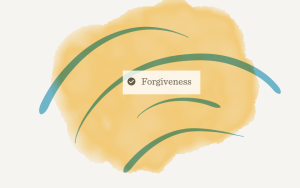Today’s guest post comes from Sarah Barasch-Hagans who is a queer Jewish woman from St. Louis and a third year rabbi-in-training at the Reconstructionist Rabbinical College. Sarah is also the founder of the Fargesn Media Project and one of the founders of the acclaimed Black Lives Matter Haggadah. Her post shares her perspective on Yom Kippur. It also sheds light on the relationships between atonement and forgiveness as well as looking at how race affects those concepts. You can find more of Sarah’s writings on her blog.
Yom Kippur is the Jewish “Day of Atonement” of fasting and soul searching that seems to come every autumn exactly when we need it. This past week, after a year in which I engaged intensely in challenging accepted ideologies around race and class and power that Ferguson had highlighted in my hometown of St. Louis, Yom Kippur again came right on time. This year, I finally realized how truly countercultural in America is the Jewish approach is to apologizing and forgiving.
American society tends to make apologizing optional for the powerful yet demands forgiveness from the powerless. We have never offered reparations for slavery yet we tout as exemplary the Black families in South Carolina who have forgiven Dylann Roof for mass murdering their relatives while they prayed in church–even though he has expressed no remorse for his evil actions. On the heels of this news, set amidst this year of the rebirth of the Black Civil Rights Movement, it has felt especially important to me clarify the theology of forgiveness in Judaism.
In Judaism, we are not required to forgive those that wrong us. Rather, responsibility rests with the one who has done wrong and is required to atone. Even if we are not forgiven the first time we apologize, we must still attempt to fulfill the commandment by offering atonement three times with sincerity. Especially in cases where we may have sinned repeatedly, demonstrating sincerity arguably requires that we perform actions to show we are on a path to truly changing the behavior we are apologizing for. Only then, only after we have sincerely attempted atonement with the person three times, are we are said to have atoned properly before God.
This theology has serious implications for dialogues on race in our country. I believe that Jewish theology is absolutely clear that the current role of White Americans–Jewish and non-Jewish–is to atone.
Judaism would not demand that individual Black Americans forgive White People or the institutions that uphold racism. If individual Black Americans find peace in forgiveness, that is their choice, but but that is not required. Jewish tradition does have much to say about short term restorative justice and and long term reconciliation and community building, but is a conversation for another day.
We must delay those conversations because they are too comforting. This is our time to avoid the impulse to deflect blame or to try to plan for the future. This moment, this exact season in the Jewish calendar, is when we atone without knowing whether we will ever reach a place of comfort.
This time is for difficult spiritual exercises by those of us who are implicated in sinful cycles. Each of us of all races and genders and class backgrounds and sexualities and ability levels must look honestly at ourselves and our place in oppression, interpersonal and communal, and seek teshuvah–usually translated as atonement but literally meaning “turning.” This is our time of turning towards a path of love and justice. This is our time to exercise faith in turning to a path we may not even be able to imagine. Because until we are absolutely honest about the path we are on, we will never be able to see, much less travel, along the path we seek.

 herself. I kept on watching her, envying her a bit and I wondered from where all this could possibly come from; all this unrestrained joy and happiness, this peacefulness, not worrying about a thing, and tuning out the world’s noise and living in your own song.
herself. I kept on watching her, envying her a bit and I wondered from where all this could possibly come from; all this unrestrained joy and happiness, this peacefulness, not worrying about a thing, and tuning out the world’s noise and living in your own song.

